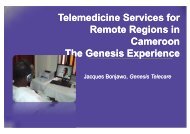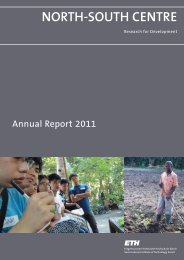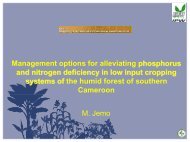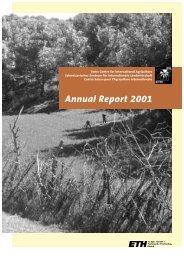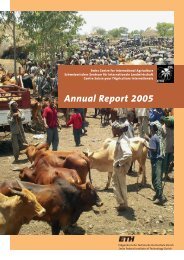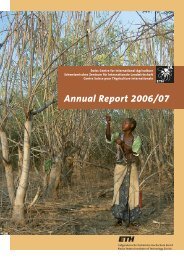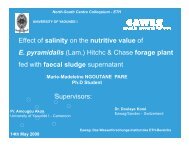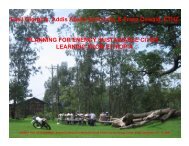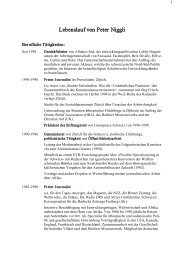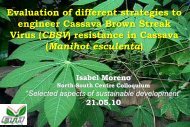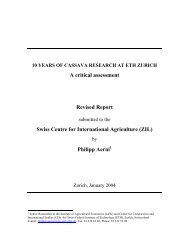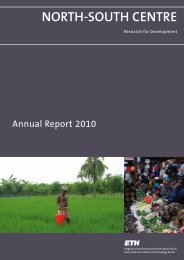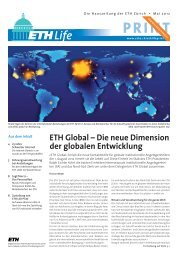NORTH-SOUTH CENTRE - ETH - North-South Centre North-South ...
NORTH-SOUTH CENTRE - ETH - North-South Centre North-South ...
NORTH-SOUTH CENTRE - ETH - North-South Centre North-South ...
Create successful ePaper yourself
Turn your PDF publications into a flip-book with our unique Google optimized e-Paper software.
academic community and by explicitly valuing R4D activities.<br />
In this context, research institutions (in contrast to universities)<br />
have the advantage that permanent research staff<br />
can conduct R4D activities that require long-term engagement.<br />
All academic research institutions, however, must be<br />
willing to trust in their researchers over appropriate time<br />
horizons and to avoid overly simplistic indicators.<br />
Outlook<br />
Research for development presents one specific case of the<br />
general question of how academic institutions should contribute<br />
to society. Academic institutions must determine<br />
appropriate balances between applied and fundamental research,<br />
between the generation and transfer of knowledge,<br />
and balance between the transfer of knowledge within and<br />
outside the academic community.<br />
It is not reasonable to expect a single simple answer or perfect<br />
solution for all academic institutions or even for any<br />
single institution. The contributions of academic institutions<br />
to societies must account for different opportunities<br />
in different fields and also for the different interests and<br />
talents of individuals. It would, perhaps, be best to take a<br />
pragmatic and adaptive approach that evolves over time in<br />
response to changing opportunities and constraints.<br />
Close interaction between researchers and local<br />
practitioners on an applied research project in Burkina Faso<br />
In considering how to meet the future challenges in R4D, it<br />
is both important and inspiring to recall the many significant<br />
contributions that academic researchers have already<br />
made, and continue to make, in this field. All of us who are<br />
interested in conducting and promoting R4D can learn from<br />
their experiences to imitate approaches and strategies that<br />
have been successful and avoid those that have not. As just<br />
one example, we can be encouraged that a compendium of<br />
sanitation technologies developed within the academic research<br />
community (Tilley, 2008) 2 has been translated by development<br />
agencies and NGOs (at their own expense) into<br />
Vietnamese, French, Spanish, Nepali, and Urdu. In addition,<br />
it is being used by the Bill and Melinda Gates Foundation to<br />
guide internal discussion for its programme in Water, Sanitation,<br />
and Hygiene.<br />
Despite past and present contributions and engagement,<br />
much remains to be accomplished in R4D as documented in<br />
reports on progress toward the Millennium Development<br />
Goals (United Nations, 2009). Collaboration and mutual<br />
support among R4D researchers are crucial to increasing<br />
the effectiveness and efficiency of these activities.<br />
References<br />
Karran, T., 2007: Academic freedom in Europe: A preliminary comparative<br />
analysis. Higher Education Policy, 20: 289–313.<br />
Zilahy, G., et al, 2009: Roles of academia in regional sustainability<br />
initiatives: Outreach for a more sustainable future. Journal of Cleaner<br />
Production, 17: 1053–1056.<br />
Commission for Research Partnership with Developing Countries<br />
(KFPE), 1998: Guidelines for Research in Partnership with Developing<br />
Countries: 11 Principles. KFPE, Bern, Switzerland: 21 pp.<br />
Tilley, E., et al, 2008: Compendium of Sanitation Systems and Technologies.<br />
Eawag, Swiss Federal Institute of Aquatic Science and Technology,<br />
Dübendorf, Switzerland: 159 pp.<br />
United Nations, 2009: The Millennium Development Goals Report<br />
2009. United Nations, New York, USA: 55 pp.<br />
2 This article was inspired by the contributions made to R4D by Roland Schertenleib over his 30-year career at Eawag as<br />
Head of the Department of Water and Sanitation for Developing Countries (Sandec) and member of the Eawag Directorate,<br />
as an Adjunct Professor at the <strong>ETH</strong> Zurich, and as a member of the Board of Directors of the NCCR <strong>North</strong>-<strong>South</strong>.<br />
29<br />
FOCUS<br />
Research for development



